Chenran Li
CHIP: Adaptive Compliance for Humanoid Control through Hindsight Perturbation
Dec 16, 2025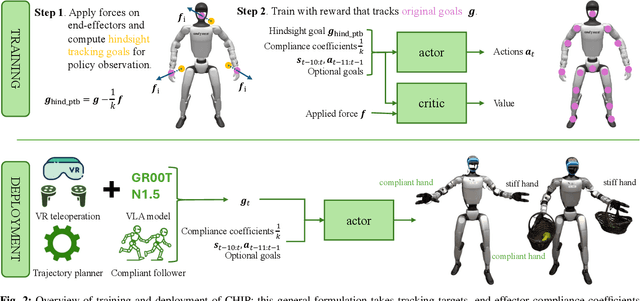
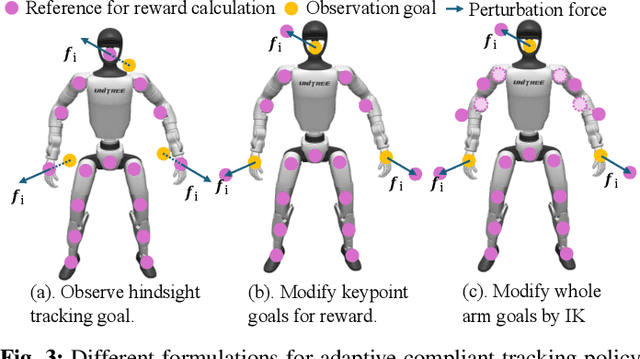
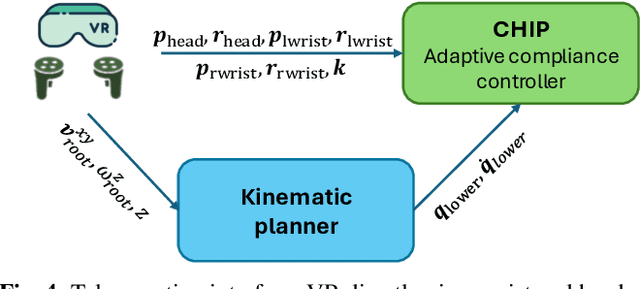
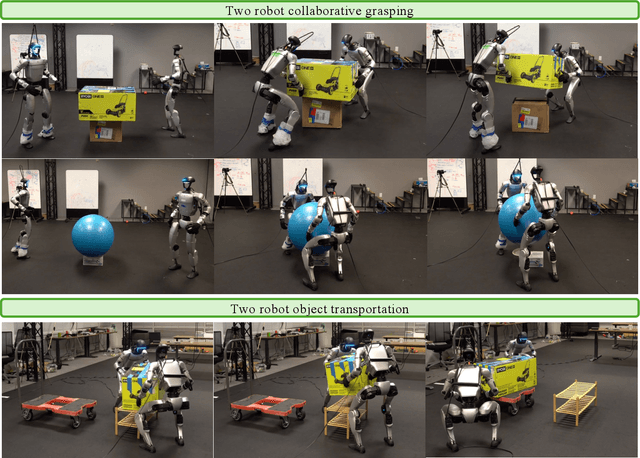
Abstract:Recent progress in humanoid robots has unlocked agile locomotion skills, including backflipping, running, and crawling. Yet it remains challenging for a humanoid robot to perform forceful manipulation tasks such as moving objects, wiping, and pushing a cart. We propose adaptive Compliance Humanoid control through hIsight Perturbation (CHIP), a plug-and-play module that enables controllable end-effector stiffness while preserving agile tracking of dynamic reference motions. CHIP is easy to implement and requires neither data augmentation nor additional reward tuning. We show that a generalist motion-tracking controller trained with CHIP can perform a diverse set of forceful manipulation tasks that require different end-effector compliance, such as multi-robot collaboration, wiping, box delivery, and door opening.
SONIC: Supersizing Motion Tracking for Natural Humanoid Whole-Body Control
Nov 11, 2025Abstract:Despite the rise of billion-parameter foundation models trained across thousands of GPUs, similar scaling gains have not been shown for humanoid control. Current neural controllers for humanoids remain modest in size, target a limited behavior set, and are trained on a handful of GPUs over several days. We show that scaling up model capacity, data, and compute yields a generalist humanoid controller capable of creating natural and robust whole-body movements. Specifically, we posit motion tracking as a natural and scalable task for humanoid control, leverageing dense supervision from diverse motion-capture data to acquire human motion priors without manual reward engineering. We build a foundation model for motion tracking by scaling along three axes: network size (from 1.2M to 42M parameters), dataset volume (over 100M frames, 700 hours of high-quality motion data), and compute (9k GPU hours). Beyond demonstrating the benefits of scale, we show the practical utility of our model through two mechanisms: (1) a real-time universal kinematic planner that bridges motion tracking to downstream task execution, enabling natural and interactive control, and (2) a unified token space that supports various motion input interfaces, such as VR teleoperation devices, human videos, and vision-language-action (VLA) models, all using the same policy. Scaling motion tracking exhibits favorable properties: performance improves steadily with increased compute and data diversity, and learned representations generalize to unseen motions, establishing motion tracking at scale as a practical foundation for humanoid control.
Isaac Lab: A GPU-Accelerated Simulation Framework for Multi-Modal Robot Learning
Nov 06, 2025



Abstract:We present Isaac Lab, the natural successor to Isaac Gym, which extends the paradigm of GPU-native robotics simulation into the era of large-scale multi-modal learning. Isaac Lab combines high-fidelity GPU parallel physics, photorealistic rendering, and a modular, composable architecture for designing environments and training robot policies. Beyond physics and rendering, the framework integrates actuator models, multi-frequency sensor simulation, data collection pipelines, and domain randomization tools, unifying best practices for reinforcement and imitation learning at scale within a single extensible platform. We highlight its application to a diverse set of challenges, including whole-body control, cross-embodiment mobility, contact-rich and dexterous manipulation, and the integration of human demonstrations for skill acquisition. Finally, we discuss upcoming integration with the differentiable, GPU-accelerated Newton physics engine, which promises new opportunities for scalable, data-efficient, and gradient-based approaches to robot learning. We believe Isaac Lab's combination of advanced simulation capabilities, rich sensing, and data-center scale execution will help unlock the next generation of breakthroughs in robotics research.
DexCtrl: Towards Sim-to-Real Dexterity with Adaptive Controller Learning
May 02, 2025


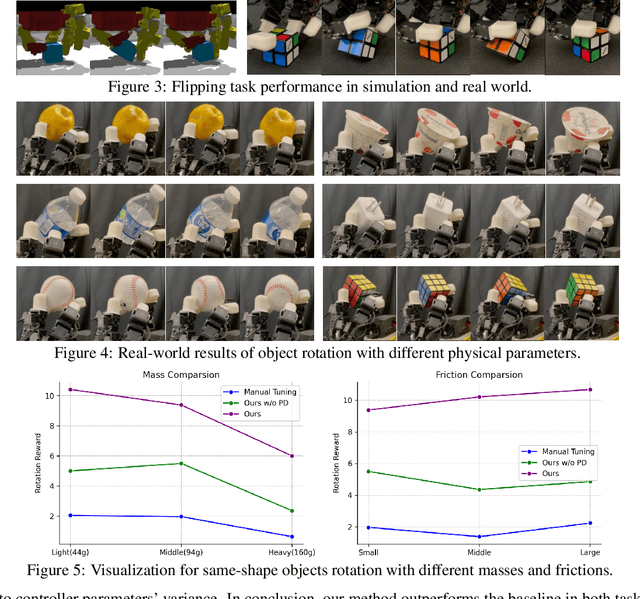
Abstract:Dexterous manipulation has seen remarkable progress in recent years, with policies capable of executing many complex and contact-rich tasks in simulation. However, transferring these policies from simulation to real world remains a significant challenge. One important issue is the mismatch in low-level controller dynamics, where identical trajectories can lead to vastly different contact forces and behaviors when control parameters vary. Existing approaches often rely on manual tuning or controller randomization, which can be labor-intensive, task-specific, and introduce significant training difficulty. In this work, we propose a framework that jointly learns actions and controller parameters based on the historical information of both trajectory and controller. This adaptive controller adjustment mechanism allows the policy to automatically tune control parameters during execution, thereby mitigating the sim-to-real gap without extensive manual tuning or excessive randomization. Moreover, by explicitly providing controller parameters as part of the observation, our approach facilitates better reasoning over force interactions and improves robustness in real-world scenarios. Experimental results demonstrate that our method achieves improved transfer performance across a variety of dexterous tasks involving variable force conditions.
Residual Policy Gradient: A Reward View of KL-regularized Objective
Mar 14, 2025



Abstract:Reinforcement Learning and Imitation Learning have achieved widespread success in many domains but remain constrained during real-world deployment. One of the main issues is the additional requirements that were not considered during training. To address this challenge, policy customization has been introduced, aiming to adapt a prior policy while preserving its inherent properties and meeting new task-specific requirements. A principled approach to policy customization is Residual Q-Learning (RQL), which formulates the problem as a Markov Decision Process (MDP) and derives a family of value-based learning algorithms. However, RQL has not yet been applied to policy gradient methods, which restricts its applicability, especially in tasks where policy gradient has already proven more effective. In this work, we first derive a concise form of Soft Policy Gradient as a preliminary. Building on this, we introduce Residual Policy Gradient (RPG), which extends RQL to policy gradient methods, allowing policy customization in gradient-based RL settings. With the view of RPG, we rethink the KL-regularized objective widely used in RL fine-tuning. We show that under certain assumptions, KL-regularized objective leads to a maximum-entropy policy that balances the inherent properties and task-specific requirements on a reward-level. Our experiments in MuJoCo demonstrate the effectiveness of Soft Policy Gradient and Residual Policy Gradient.
COMPASS: Cross-embodiment Mobility Policy via Residual RL and Skill Synthesis
Feb 22, 2025



Abstract:As robots are increasingly deployed in diverse application domains, generalizable cross-embodiment mobility policies are increasingly essential. While classical mobility stacks have proven effective on specific robot platforms, they pose significant challenges when scaling to new embodiments. Learning-based methods, such as imitation learning (IL) and reinforcement learning (RL), offer alternative solutions but suffer from covariate shift, sparse sampling in large environments, and embodiment-specific constraints. This paper introduces COMPASS, a novel workflow for developing cross-embodiment mobility policies by integrating IL, residual RL, and policy distillation. We begin with IL on a mobile robot, leveraging easily accessible teacher policies to train a foundational model that combines a world model with a mobility policy. Building on this base, we employ residual RL to fine-tune embodiment-specific policies, exploiting pre-trained representations to improve sampling efficiency in handling various physical constraints and sensor modalities. Finally, policy distillation merges these embodiment-specialist policies into a single robust cross-embodiment policy. We empirically demonstrate that COMPASS scales effectively across diverse robot platforms while maintaining adaptability to various environment configurations, achieving a generalist policy with a success rate approximately 5X higher than the pre-trained IL policy. The resulting framework offers an efficient, scalable solution for cross-embodiment mobility, enabling robots with different designs to navigate safely and efficiently in complex scenarios.
Optimal Driver Warning Generation in Dynamic Driving Environment
Nov 09, 2024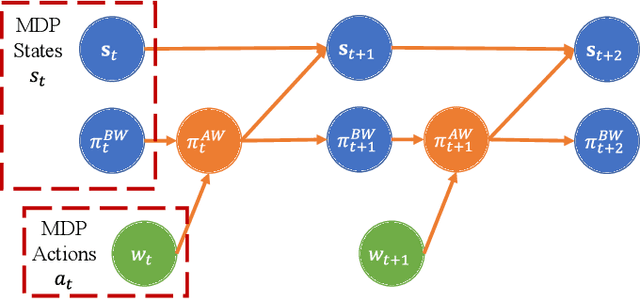
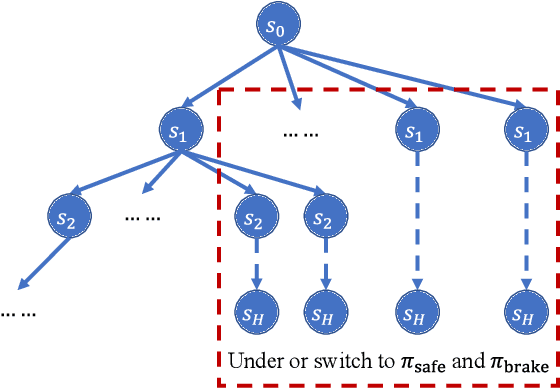
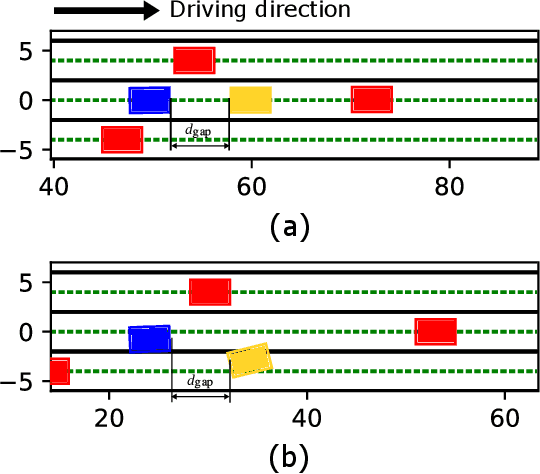
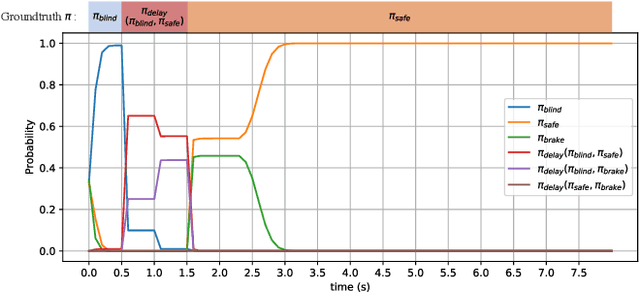
Abstract:The driver warning system that alerts the human driver about potential risks during driving is a key feature of an advanced driver assistance system. Existing driver warning technologies, mainly the forward collision warning and unsafe lane change warning, can reduce the risk of collision caused by human errors. However, the current design methods have several major limitations. Firstly, the warnings are mainly generated in a one-shot manner without modeling the ego driver's reactions and surrounding objects, which reduces the flexibility and generality of the system over different scenarios. Additionally, the triggering conditions of warning are mostly rule-based threshold-checking given the current state, which lacks the prediction of the potential risk in a sufficiently long future horizon. In this work, we study the problem of optimally generating driver warnings by considering the interactions among the generated warning, the driver behavior, and the states of ego and surrounding vehicles on a long horizon. The warning generation problem is formulated as a partially observed Markov decision process (POMDP). An optimal warning generation framework is proposed as a solution to the proposed POMDP. The simulation experiments demonstrate the superiority of the proposed solution to the existing warning generation methods.
DexH2R: Task-oriented Dexterous Manipulation from Human to Robots
Nov 07, 2024Abstract:Dexterous manipulation is a critical aspect of human capability, enabling interaction with a wide variety of objects. Recent advancements in learning from human demonstrations and teleoperation have enabled progress for robots in such ability. However, these approaches either require complex data collection such as costly human effort for eye-robot contact, or suffer from poor generalization when faced with novel scenarios. To solve both challenges, we propose a framework, DexH2R, that combines human hand motion retargeting with a task-oriented residual action policy, improving task performance by bridging the embodiment gap between human and robotic dexterous hands. Specifically, DexH2R learns the residual policy directly from retargeted primitive actions and task-oriented rewards, eliminating the need for labor-intensive teleoperation systems. Moreover, we incorporate test-time guidance for novel scenarios by taking in desired trajectories of human hands and objects, allowing the dexterous hand to acquire new skills with high generalizability. Extensive experiments in both simulation and real-world environments demonstrate the effectiveness of our work, outperforming prior state-of-the-arts by 40% across various settings.
X-MOBILITY: End-To-End Generalizable Navigation via World Modeling
Oct 23, 2024



Abstract:General-purpose navigation in challenging environments remains a significant problem in robotics, with current state-of-the-art approaches facing myriad limitations. Classical approaches struggle with cluttered settings and require extensive tuning, while learning-based methods face difficulties generalizing to out-of-distribution environments. This paper introduces X-Mobility, an end-to-end generalizable navigation model that overcomes existing challenges by leveraging three key ideas. First, X-Mobility employs an auto-regressive world modeling architecture with a latent state space to capture world dynamics. Second, a diverse set of multi-head decoders enables the model to learn a rich state representation that correlates strongly with effective navigation skills. Third, by decoupling world modeling from action policy, our architecture can train effectively on a variety of data sources, both with and without expert policies: off-policy data allows the model to learn world dynamics, while on-policy data with supervisory control enables optimal action policy learning. Through extensive experiments, we demonstrate that X-Mobility not only generalizes effectively but also surpasses current state-of-the-art navigation approaches. Additionally, X-Mobility also achieves zero-shot Sim2Real transferability and shows strong potential for cross-embodiment generalization.
WOMD-Reasoning: A Large-Scale Language Dataset for Interaction and Driving Intentions Reasoning
Jul 05, 2024



Abstract:We propose Waymo Open Motion Dataset-Reasoning (WOMD-Reasoning), a language annotation dataset built on WOMD, with a focus on describing and reasoning interactions and intentions in driving scenarios. Previous language datasets primarily captured interactions caused by close distances. However, interactions induced by traffic rules and human intentions, which can occur over long distances, are yet sufficiently covered, despite being very common and more challenging for prediction or planning models to understand. Therefore, our WOMD-Reasoning focuses extensively on these interactions, providing a total of 409k Q&As for varying types of interactions. Additionally, WOMD-Reasoning presents by far the largest Q&A dataset on real-world driving scenarios, with around 3 million Q&As covering various topics of autonomous driving from map descriptions, motion status descriptions, to narratives and analyses of agents' interactions, behaviors, and intentions. This extensive textual information enables fine-tuning driving-related Large Language Models (LLMs) for a wide range of applications like scene description, prediction, planning, etc. By incorporating interaction and intention language from WOMD-Reasoning, we see significant enhancements in the performance of the state-of-the-art trajectory prediction model, Multipath++, with improvements of 10.14% in $MR_6$ and 6.90% in $minFDE_6$, proving the effectiveness of WOMD-Reasoning. We hope WOMD-Reasoning would empower LLMs in driving to offer better interaction understanding and behavioral reasoning. The dataset is available on https://waymo.com/open/download .
 Add to Chrome
Add to Chrome Add to Firefox
Add to Firefox Add to Edge
Add to Edge